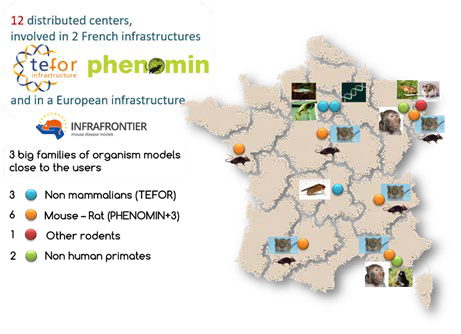
|
|
|
About Us > CELPHEDIA
(Création, ELevage, PHEnotypage, DIstribution et Archivage d'organismes modèles)

A French distributed infrastructure led by the CNRS, labeled in the national cartography of the Ministry of Higher Education, Research and Innovation. It has 12 service units spread across France, including 2 infrastructures that have benefited from the Future Investment Plan: PHENOMIN and TEFOR.
It mainly aims to develop innovative, standardized and massively parallel technological approaches, and to improve and harmonize procedures and protocols, which guarantee efficiency and reliability, thus facilitating national or international access to the models of interest. Finally, it supports acceleration of the understanding of the genome by favoring the generation of human or animal disease models.
CELPHEDIA's aim is to gather their skills to open up to the academic and private scientific community in order to help researchers to choose the most suitable animal model to answer a given scientific question. Thus, CELPHEDIA covers 3 main families of organisms: non- mammals, rodents and non-human primates. The infrastructure is divided into 3 sectors of activity: i) Highly standardized service offers, with respect for ethics and animal welfare, ii) Research and development of new technological offers, iii) Support through training.
CELPHEDIA therefore offers a wide catalogue of cutting-edge services with standardized processes that respect animal welfare and ethics.
CELPHEDIA gathers a critical mass of expertise and skills unique in Europe. CELPHEDIA's centers have developed innovative and standardized approaches to create models of human diseases, to understand the human genome and to promote therapeutic innovation. Such unique access allows better translation from one model to another. Especially through PHENOMIN, CELPHEDIA is involved in about 10 European projects and in international consortium IMPC, and then contributes to the functional annotation of the genome.
CELPHEDIA is also an active network open to the scientific community and to the most widely used animal models for scientific purposes


